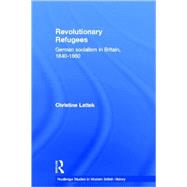- ISBN: 9780714651002 | 0714651001
- Cover: Hardcover
- Copyright: 1/30/2002
The substantial German colony in mid-19th century London included not only Karl Marx, but hundreds of less well-known exiles planning a revolution at home and hoping to introduce socialism. "Revolutionary Refugees" traces the developments of this German socialism in Britain from its origins in artisans' clubs, through the revolutionary movements of 1848, to the differing reactions to their failure. Often opposed to Marx and in competition with liberal radicalism, the migr s developed both an independent socialist strategy as well as internationalist ideas and activities. They cultivated contacts with English Chartists as well as French, Italian, Polish and other foreign exiles, and also contributed to a vibrant social life within their own ethnic community. The book makes some substantial and novel arguments. The first concerns the relationship between early German "Utopian" socialism and the growing dominance of Marx and Engels in groups like the "Communist League". This form of artisan socialism, ledby Karl Schapper and August Willich, remained largely antagonistic to Marx and shared exile politics far more than is traditionally assumed. The second concerns the split between groups of socialists and the majority of radical democrats, and how these groups related to the British authorities and to other exile groups in Europe and America. It also examines their support of the Chartists and the emergence of internationalism in their activities. This study places the development of exile politics in the overall framework of the flourishing German colony - the largest foreign ethnic community in mid-Victorian England - and examines its social history as well. It is thus the first substantial study to analyze this crucial stage in the development of the social and cultural environment of this immigrant community.







